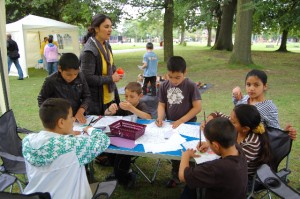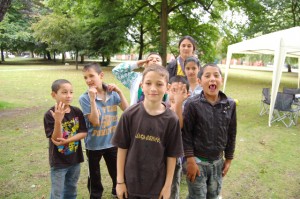It is a simple act that speaks volumes about the barriers that have been broken; a young Roma boy hands a flower to the play worker he had been so challenging towards just two weeks ago.
The scene took place in August at a groundbreaking playscheme run by social enterprise the Big Life group which encouraged Roma children aged 7-11 to mix with their local Manchester counterparts.
As Europe’s largest ethnic minority, the 12m-strong Roma population might be dispersed across the EU, but it is unified in the discrimination routinely faced by its people. From being moved on from traveller sites to outright repatriation, Roma families live in poverty and are reluctant to contact statuary services fear being moved on or suffer harassment.
Negative perceptions of the Roma community in Manchester along with an increase in the number of Roma people wanting to sell The Big Issue in the North led to the launch of the Big Life group summer play scheme (Big Life owns the Big Issue in the North). Open to all children living in the Longsight area of Manchester, it aimed to break down barriers between the communities and reduce the perceived or actual nuisance behaviour over the summer.
The scheme was publicised through leaflets given out during the social enterprise’s family support sessions and through local children’s centres. Word of mouth also encouraged Roma children to access the project.

The scheme, jointly funded by Manchester city council and The Big Issue in the North Trust, did not charge participants and 60 children registered across the month-long scheme with a total of 30 per session. Take up was even; 52 % Roma registrations and 48% from other communities.
Project leader Daniel Achim recalls that the scheme got off to a shaky start: “At the beginning all children seemed to be rather slow to action the requests of the play workers. The children were testing the boundaries and the workers had to repeat the same information over and over again in order to get a result.”
Yet, as Achim says, by the end of the playscheme there was a major transformation in the behaviour of the children in terms of respect and politeness to staff. “In a safe and welcoming environment where they were not discriminated against children learned to relax around each other, they learned to share play equipment, they learned to wait their turn.”

While entrenched attitudes towards those who are different can be hard to shatter, the Big Life playscheme shows how to break down barriers through play. Any mutual suspicion was soon overcome. Encouraging integration through play and from an early age is starting to reap rewards.
As Achim says, often the tensions tended to be between children from the same backgrounds: “Sometimes it is easy to see differences between communities – when really it is just kids being kids.”

One thought on “How Roma integration could be child’s play”
Comments are closed.